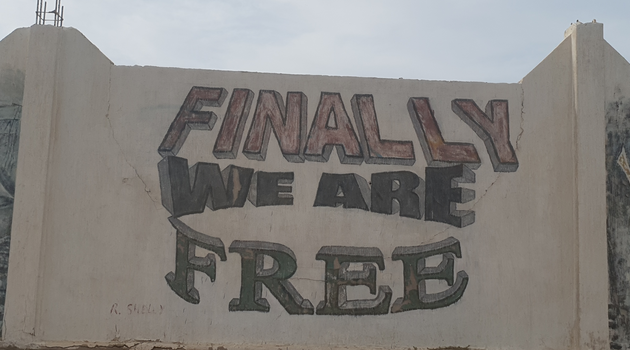By Sultan Hajiyev, UNDP Country Director in Libya:
We are right there, when and where people need us
It is still there, on one of the walls along the road from the Mitiga International Airport to the city Centre in Tripoli. A huge graffiti, saying ‘Finally we are free’. I am not sure who put it there but I am certain when it appeared – sometime in the summer of 2011 after the battle of Tripoli.
A starting point for the road to freedom, which became very exacting for Libyans. It started with a rapid deterioration in the economic and political situation, with the country torn apart among rival factions.
I do not intend to list tragic pages of the recent history of the country – Libyans, and those following developments in the country are painfully familiar with each and every line, or perhaps even each and every letter. It is written in blood and tears.
I believe that the Chinese character for ‘crisis’ is made up of ‘challenge’ and ‘opportunity’. From my experience of having worked in several complex emergencies, Afghanistan, Iraq and Somalia among them, this is what UNDP’s mandate in protracted crisis environments is.
We support countries in managing challenges and availing themselves of opportunities. And this is what we are about in Libya – the magnitude and complexity of challenges the country is facing demand UNDP’s proactive engagement.
The decision of the UN Secretary General lifting the evacuation status for Libya (introduced following major deterioration of the security situation in the country back in 2014) allows UNDP and others of the UN family to return to the country and further reinforce our support to our partners here.
Let me retract this slightly – it is not really a return because we have never left completely. We reduced our presence on the ground drastically, operating mainly from Tunis and, despite the adverse circumstances, trying to help Libya achieve the sustainable development and peace that people desperately are looking for.
We ramped up our presence now, with UNDP proudly among the pioneer UN agencies which spearheaded the return of the UN system. We are doing it with resolve, aspiring to return to a long-term presence outside Tripoli soon as well. We are really convinced that for us to prove our role of the development partner of choice, feeling and knowing the needs of our partners and beneficiaries, we must be on the ground. UNDP Libya must be in Libya.
While truly excited with this chance to fully re-establish our presence in the country, we remain fully cognizant of many challenges ahead. Despite months of relative calm, the security situation remains complex – and barbaric attack at the Libya’s High National Elections Commission is painful reminder of many dangers the country is still facing.
The hard-won fruits of national reconciliation are still relatively fragile and need concerted effort by all players, steering the country through the many dangers of the post-conflict environment. Libya is also a major transit and destination area for migrants, who often become easy targets for human trafficking and human rights violations. Another item on a long list of multiple challenges Libya is facing.
But despite multiple administrative and operational challenges, including drastic increase in costs of operating from Tripoli when compared to those of Tunis, we are determined to manage. We know we can count on valuable support and assistance from our Government partners, CSOs and NGOs, and donors. There is so much to do, and so many needs, including many urgent ones.
We want to help Libya to make the transition to sustainable development by helping the Government to rehabilitate key infrastructure, expanding livelihood opportunities for groups in greatest need. We want to help citizens to participate actively in Libya’s democratic transition to a state founded on the rule of law – and that must include women and youth playing a central role and seeing their rights fully respected.
We want to help central and local government to improve delivery of basic services, and to respond to the full range of Libyan citizens’ voices. We want to support inclusive national reconciliation and transitional justice processes.
Every single objective requires dedicated effort, and some of them will take years. But no matter how long and thorny is the journey, we will keep walking. We can now do so on Libyan soil. We look forward to supporting Libyans in bringing a day when the proud ‘Finally we are free’ can be followed with ‘and fully enjoy the fruits of our freedom’.
This is what true friends of Libya want – and this is what Libyans owe to their friends, but most importantly to themselves and to their next generations. This is what it takes to prove their sacrifice was not in vain.
Ramadan Kareem from UNDP Libya.
(Source: UNDP)





